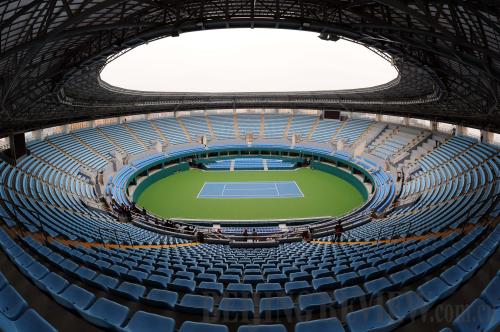|
 |
|
READY TO GO: The Guangdong Olympic Tennis Center is one of the 12 new venues constructed for the 16th Asian Games (LIU DAWEI) |
The pieces of the upcoming 16th Asian Games, to be held on November 12, are falling into place as the host city Guangzhou prepares for an influx of athletes and sports spectators.
Spirits are high among local officials in Guangzhou, south China's Guangdong Province, especially Vice Mayor Xu Ruisheng, who has worked tirelessly to ensure the games are successful for the city and the country.
"I always prefer saying we are moving on 'as scheduled' instead of 'we are completely ready'," said Xu, who is also the Executive Deputy Secretary General of Guangzhou Asian Games Organizing Committee (GAGOC).
A number of obstacles can arise before the curtain is drawn for such a large event like this, Xu said, but GAGOC and the entire city is prepared for anything.
"The level of preparation and emergency plans we have in place will make all the difference," Xu said with bloodshot eyes, evidence of sleepless nights of planning.
New interior decorations and equipment were recently installed in all event venues and facilities. Teams of operators were sent to each venue for run-through operations - 40 such trial runs in total - and all venues are expected to be ready for the November event.
"Sure, problems will arise when plans are put to the test during the trial period, but we'll make adjustments accordingly," he said.
Asiad's appeal
Also called the Asiad and held every four years, the Asian Games as an intercontinental event are different from international sports events and provides sufficient opportunities for unique and diversified cultures across Asia, according to Xu.
With this in mind, GAGOC and the Olympic Council of Asia (OCA) organized the Road of Asia program, during which a GAGOC delegation visited National Olympic Councils in 37 Asian countries and regions. GAGOC will hold a series of exhibitions on Asian countries' culture and heritage before and during the event.
The 16th Asian Games will include as many as 42 sports, the most in the Asiad's history. Of the total, 14 are non-Olympic sports popular in Southeast Asian countries, which in particular will "ensure each Asian country takes an interest in participating," he said.
Match schedules weren't released until the third round of athlete application completed on September 30. But statistics so far indicated Guangzhou would attract more athletes than any previous host city, with participation from all 45 countries and regions in Asia.
However, since GAGOC cannot be as ambitious as Beijing Olympic organizers in terms of ticket sales, making financial ends meet remains their goal, according to Xu.
"Compared with the Beijing Olympics in 2008, the Guangzhou Asian Games is less appealing to an international audience. It has no qualification rounds, and the venue for the opening and closing ceremonies can hold an audience of a little more than 20,000, only one third of the Bird's Nest's (the National Stadium) capacity," he said.
Guangzhou will stage the opening and closing ceremonies on Haixinsha Island in the Pearl River, allowing artists to incorporate elements of the surrounding landscape into their performance.
"The local culture, as well as all of Asia's diversified cultural heritage, will be demonstrated at this special venue," Xu said.
Olympic Councils of Asian countries are entrusted with overseas ticket sales for the event, and in total the event is expected to attract more than 2 million people, he added.
|